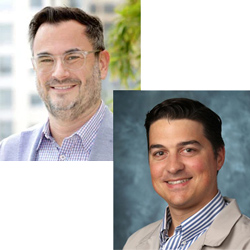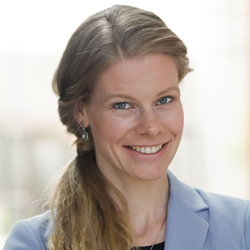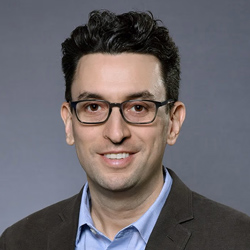Events
Past Event
WED@NICO WEBINAR: Lightning Talks with Northwestern Fellows and Scholars!
Northwestern Institute on Complex Systems (NICO)
12:00 PM
Details
Description:
NICO is hosting a lightning talk seminar each term as a part of our Wednesdays@NICO seminar series. Northwestern graduate students and postdoctoral fellows are invited to participate. To sign up for future lightning talks, please visit: https://bit.ly/2lRqSXK
Webinar:
Webinar link: https://northwestern.zoom.us/j/96018513447
Passcode: nico
ID: 960 1851 3447
Speakers:
Jaehyuk Park
Postdoctoral Fellow
Kellogg School of Managmeent, and
Northwestern Institute on Complex Systems
Emma Zajdela
PhD Candidate
Department of Engineering Sciences and Applied Mathematics
McCormick School of Engineering
Gary Nave
Postdoctoral Fellow
Department of Engineering Sciences and Applied Mathematics
McCormick School of Engineering
Sarah Ben Maamar
Postdoctoral Fellow
Department of Chemical and Biological Engineering
McCormick School of Engineering
Talk Titles and Abstracts:
Jaehyuk Park "People, Places, and Ties: Landscape of social places and their social network structures"
Due to their essential role as places for socialization, “third places”—social places where people casually visit and communicate with friends and neighbors—have been studied by a wide range of fields including network science, sociology, geography, urban planning, and regional studies. However, the lack of a large-scale census on third places kept researchers from systematic investigations. Here we provide a systematic nationwide investigation of third places and their social networks, by using Facebook pages. Our analysis reveals a large degree of geographic heterogeneity in the distribution of the types of third places, which is highly correlated with baseline demographics and county characteristics. Certain types of pages like “Places of Worship” demonstrate a large degree of clustering suggesting community preference or potential complementarities to concentration. We also found that the social networks of different types of social place differ in important ways: The social networks of ‘Restaurants’ and ‘Indoor Recreation’ pages are more likely to be tight-knit communities of pre-existing friendships whereas ‘Places of Worship’ and ‘Community Amenities’ page categories are more likely to bridge new friendship ties. We believe that this study can serve as an important milestone for future studies on the systematic comparative study of social spaces and their social relationships. This is joint work with Bogdan State (scie.nz), Monica Bhole (Facebook), Michael Bailey (Facebook), and Yong-Yeol Ahn (Indiana Univ.).
Emma Zajdela "Catalyzing Collaborations: A Model for the Dynamics of Team Formation at Conferences"
The COVID-19 pandemic has brought to the fore the importance of collaboration among scientists to address challenges of global significance. One of the main ways that new and innovative collaborations are catalyzed is by gathering scientists together at conferences. In the U.S. alone, conferences amount to billions of dollars per year in terms of travel expenses, organizing costs, and loss of research time. In this lightning talk, I present a dynamical model for predicting the formation of scientific collaborations at conferences, inspired by the chemical process of catalysis. Specifically, the model tracks the probability that two participants at a conference will form a collaboration given their previous knowledge of each other and level of interaction throughout the conference. Model predictions are tested using data from two multi-year series of interactive conferences known as the Scialog Conferences, organized by the Research Corporation for Science Advancement over the period 2015-2020. We find that scientists who interact more intensely throughout the conference have a higher likelihood of forming a collaboration. Furthermore, we find that the likelihood of collaborating remains at a higher level even after the interaction between participants has ceased. Our findings may have an impact on stakeholders from public, private, and nonprofit sectors who wish to optimize future conferences to promote new collaborations.
Gary Nave "Approximating attracting and repelling flow features with the trajectory divergence rate"
Within the flow of a fluid or a dynamical system, there are often attracting or repelling manifolds that provide an organizing “skeleton” to the flow. These structures have been shown to be barriers to transport of material moving within a flow. In this talk, I will introduce the trajectory divergence rate, which can serve to rapidly approximate attracting and repelling structures using only the vector field. By looking at the instantaneous growth rate of normal vectors, we measure the rate at which adjacent trajectories are coming together or moving apart. This diagnostic can be applied to, for example, slow manifolds, ocean flows, and limit cycle oscillations, and provides an intuitive understanding of the geometric organization of a flow.
Sarah Ben Maamar "Comprehensive analysis of the reproducibility of RNAseq computational pipelines"
Sarah Ben Maamar, Reese Richardson, Sophia Liu, Luis Nunes A. Amaral.
Next generation sequencing technologies revolutionized biomedical research and became unavoidable due to their low costs, high amount of data generated and the wide variety of their applications. In particular, RNA-sequencing (RNA-seq) has become widely used in biological and biomedical fields as this technique allows the evaluation of gene expression levels in model organisms under different contexts. These contexts include the comparison of sick versus healthy cells; the effect of specific drugs on cells gene expression; monitoring of changes in gene expression over time; or the discovery of the potential role of an unknown gene when comparing different tissues.
As the output of RNA-seq is complex and large, processing and analysis of such data requires the use of complex computational pipelines involving multiple steps and softwares to make the data comprehensible. RNA-seq computational pipelines vary according to the application and can have up to six steps, for which up to ten different softwares are available for each task. Each software also offers multiple parameters to better tune the analysis for each application and dataset.
Despite the endless choices, there is currently no standardized pipeline agreed upon in the broad biomedical field. Thus, unless a computational pipeline used to process a dataset is thoroughly documented, it is almost impossible to reproduce the results obtained from a dataset after processing.
In this work, we analyze the documentation and replicability associated to each step of RNA-seq computational pipelines used to study differential gene expression in the model bacteria Escherichia coli. We particularly assess the intrinsic bias introduced by the use of each software for each step as well as the bias associated to each parameter choice. Interestingly, we found two to three steps of RNA-seq computational pipeline are particularly undermining the comparability of the results between studies. We are currently in the process of quantifying the biases at each step of the different computational pipelines and this talk will present some of our results.
About the Speaker Series:
Wednesdays@NICO is a vibrant weekly seminar series focusing broadly on the topics of complex systems and data science. It brings together attendees ranging from graduate students to senior faculty who span all of the schools across Northwestern, from applied math to sociology to biology and every discipline in-between. Please visit: https://bit.ly/WedatNICO for information on future speakers.
Time
Wednesday, March 3, 2021 at 12:00 PM - 1:00 PM
Contact
Calendar
Northwestern Institute on Complex Systems (NICO)
WED@NICO SEMINAR: Todd Florin and Nelson Sanchez-Pinto, Lurie Children's Hospital of Chicago "Transforming Research and Innovation for Acutely Ill Children"
Northwestern Institute on Complex Systems (NICO)
12:00 PM
//
Lower Level, Chambers Hall
Details

Speakers:
Todd Florin, MD, MSCE, Associate Division Head for Academic Affairs & Research, Division of Emergency Medicine, Ann & Robert H. Lurie Children’s Hospital of Chicago; Professor of Pediatrics (Emergency Medicine), Northwestern University Feinberg School of Medicine
L. Nelson Sanchez-Pinto, MD, MBI, Attending Physician, Critical Care, Ann & Robert Lurie Children’s Hospital of Chicago; Associate Professor of Pediatrics (Critical Care) and Preventive Medicine (Health and Biomedical Informatics), Northwestern University Feinberg School of Medicine
Title:
Transforming Research and Innovation for Acutely Ill Children
Abstract:
We will present an overview of the new Center for Pediatric Acute and Critical Care Research and Innovation (PACCRI) at Lurie Children's Hospital and its goal of fostering and facilitating ambitious, high-risk/high-reward research collaboration between clinicians and engineers, computer scientists, and data scientists. We will present two areas of active research by PACCRI faculty that may overlap with NICO faculty expertise: (1) predicting pneumonia in the emergency department, and (2) modeling hospital strain and resource allocation to prevent patient deterioration.
Speaker Bios:
Dr. Todd Florin is a founding co-director of the Center for Pediatric Acute and Critical Care Research and Innovation (PACCRI). He is a pediatric emergency medicine physician-scientist with interests in pediatric respiratory infections and expertise in clinical and molecular epidemiology, predictive analytics, and large-scale, multicenter clinical trials in the acute care setting. He is committed to generating and implementing the best evidence to allow for precision care tailored to each patient.
Dr. Nelson Sanchez-Pinto is a founding co-director of the Center for Pediatric Acute and Critical Care Research and Innovation (PACCRI). He is a pediatric critical care medicine physician-scientist with interests in sepsis and expertise in data science and clinical informatics. His goal is to develop, test, and operationalize AI-enabled predictive and prognostic enrichment strategies that can help clinicians provide more personalized and targeted care to critically ill children.
Location:
In person: Chambers Hall, 600 Foster Street, Lower Level
Remote option: https://northwestern.zoom.us/j/92586384543
PW: NICO26
About the Speaker Series:
Wednesdays@NICO is a vibrant weekly seminar series focusing broadly on the topics of complex systems, data science and network science. It brings together attendees ranging from graduate students to senior faculty who span all of the schools across Northwestern, from applied math to sociology to biology and every discipline in-between. Please visit: https://bit.ly/WedatNICO for information on future speakers.
Time
Wednesday, February 25, 2026 at 12:00 PM - 1:00 PM
Location
Lower Level, Chambers Hall Map
Contact
Calendar
Northwestern Institute on Complex Systems (NICO)
WED@NICO SEMINAR: Ágnes Horvát, Northwestern School of Communication
Northwestern Institute on Complex Systems (NICO)
12:00 PM
//
Lower Level, Chambers Hall
Details

Speaker:
Ágnes Horvát, Associate Professor, Department of Communication Studies, Northwestern School of Communication
Title:
TBA
Abstract:
TBA
Speaker Bio:
Ágnes Horvát is an Associate Professor in the Department of Communication Studies, (by courtesy) the Computer Science Department of the McCormick School of Engineering, and (also by courtesy) the Department of Management and Organizations of the Kellogg School of Management.
Her research seeks to measure, understand, and forecast the collective behaviour of networked crowds in large-scale socio-technical systems. On the one hand, her current projects investigate the impact of network embeddedness and diversity on scholarly communication. On the other hand, she works on identifying expressions of collective intelligence and opportunities for innovation in crowdsourcing communities. Her research group also develops empirical and theoretical methods to support creativity and predict success in culture industries. This work lies at the intersection of computational social science and social computing. It uses an interdisciplinary data-driven approach that builds on techniques from network science, machine learning, and statistics.
Location:
In person: Chambers Hall, 600 Foster Street, Lower Level
Remote option: https://northwestern.zoom.us/j/96701776160
PW: NICO26
About the Speaker Series:
Wednesdays@NICO is a vibrant weekly seminar series focusing broadly on the topics of complex systems, data science and network science. It brings together attendees ranging from graduate students to senior faculty who span all of the schools across Northwestern, from applied math to sociology to biology and every discipline in-between. Please visit: https://bit.ly/WedatNICO for information on future speakers.
Time
Wednesday, March 4, 2026 at 12:00 PM - 1:00 PM
Location
Lower Level, Chambers Hall Map
Contact
Calendar
Northwestern Institute on Complex Systems (NICO)
WED@NICO SEMINAR: Steven Franconeri, Northwestern University "Point Taken: A gamified Intervention that Creates Enlightened Disagreements"
Northwestern Institute on Complex Systems (NICO)
12:00 PM
//
Lower Level, Chambers Hall
Details

Speaker:
Steven Franconeri, Professor of Psychology, Weinberg College of Arts & Sciences; Professor of Management and Organizations, Kellogg School of Management, Northwestern University
Title:
Point Taken: A gamified Intervention that Creates Enlightened Disagreements
Abstract:
Should we drop standardized testing for college or Ph.D. admissions? Allow athletes to join teams based on gender identity? When organizational and public policies bind behavior, human coexistence requires a way to determine that collective policy. Because individuals and like-minded groups have incomplete information, constrained strategies, and biased perspectives, thoughtful debate on those policies is critical. Unfortunately, those debates too often degrade into chaotic fights.
Point Taken provides a scalable solution by translating best practices in conflict resolution and critical thinking into a structured dialogue that can be learned and played in 30 minutes. In this interactive session, you'll play a short game to feel its effects.
Players replace persuasion with a common goal of discovering why they disagree. Dialogue then unfolds thoughtfully and calmly, through chains of short written reasons and responses. We've tested the game extensively in schools and organizations, and conducted a formal pilot study. All show powerful improvements in the tone and quality of debate, across longstanding and strongly-held disagreements. I’ll give background on best practices for enlightened disagreement, show how they translate to the game, ask you to play a game, and then ask for your advice on next steps.
Speaker Bio:
Steven Franconeri is leading scientist, teacher, and speaker on visual thinking, visual communication, and the psychology of data visualization. He is a Professor of Psychology in the Weinberg College of Arts & Sciences at Northwestern, Director of the Northwestern Cognitive Science Program, as well as a Kellogg Professor of Management and Organizations by Courtesy. He is the director of the Visual Thinking Laboratory, where a team of researchers explore how leveraging the visual system - the largest single system in your brain - can help people think, remember, and communicate more efficiently.
His undergraduate training was in computer science and cognitive science at Rutgers University, followed by a Ph.D. in Experimental Psychology from Harvard University, and postdoctoral research at the University of British Columbia. His work on both Cognitive Science and Data Visualization has been funded by the National Science Foundation, as well as the Department of Education, and the Department of Defense. He has received a prestigious National Science Foundation CAREER award, given to researchers who combine excellent research with outstanding teaching, and he has received a Psychonomic Society Early Career award for his research on visual thinking.
Location:
In person: Chambers Hall, 600 Foster Street, Lower Level
Remote option: https://northwestern.zoom.us/j/97198523514
PW: NICO26
About the Speaker Series:
Wednesdays@NICO is a vibrant weekly seminar series focusing broadly on the topics of complex systems, data science and network science. It brings together attendees ranging from graduate students to senior faculty who span all of the schools across Northwestern, from applied math to sociology to biology and every discipline in-between. Please visit: https://bit.ly/WedatNICO for information on future speakers.
Time
Wednesday, March 11, 2026 at 12:00 PM - 1:00 PM
Location
Lower Level, Chambers Hall Map
Contact
Calendar
Northwestern Institute on Complex Systems (NICO)

